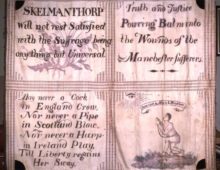Tagged with Reform
Resource : Silhouette of Thomas Muir
Thomas Muir was a radical, who campaigned for political reform in Scotland. He was eventually accused of sedition and transported to Australia, following one of the most notorious and controversial trials in Scottish history. He became known as the father of Scottish democracy and one of Scotland’s five ‘political martyrs’.
Resource : Skelmanthorpe Flag
The 1800s saw a series of protests and uprisings in Britain, as people campaigned against slavery, unjust taxes and laws imposed by the government and in support of fair wages, the right to vote and to have their voices heard in parliament. Protest flags, posters and banners carrying radical slogans were a popular way for campaigners to get their message across at marches and rallies, and to cooperate without endangering individuals. The Skelmanthorpe flag was created in secret, in Huddersfield, initially to honour the victims of what became known as the Peterloo Massacre, in 1819.
Resource : William Wilberforce speaking out against slavery in the House of Lords
The movement to abolish the Transatlantic slave trade was a long and difficult struggle. Campaigners for abolition used every means they could, including sugar boycotts, meetings, petitions, publications, and circulating images showing its shameful nature, to bring the issue to people’s attention in Europe. Enslaved Africans played an essential part, having long resisted their enslavement and treatment through ‘go-slows’, revolts, intellectual and religious claims, and demonstrable capacity to retain and transmit their African or creole (mixed) cultures and languages. Escaped or freed slaves forced judges and social elites to confront the issue through court cases, publications, and performances. Propelled by much of this pressure and evidence, William Wilberforce led the long political campaign to outlaw the slave trade in Britain.
Resource : Jeremiah Brandreth pot
The Pentrich Rising was a small armed rebellion initiated by political radicals in the Midlands in 1817, which they hoped would spread far and wide and bring about revolutionary changes to the structure of government and society.
Resource : Thomas Clarkson’s campaign chest
Between the 1500s and early 1800s, millions of Africans were kidnapped, sold and transported to the Americas to work as slaves, in unimaginably cruel conditions, on hugely profitable plantations, producing sugar, tobacco and other commodities. These plantations were largely owned by Europeans and Euro-Americans. Britain grew rich on the profits from this transatlantic slave trade, which were reinvested into other economic sectors. Only in the late eighteenth century did public opinion slowly begin to turn against the trade in Africans, and campaigners for abolition used every way they could to bring the issue to people’s attention in Europe.
Resource : Figures by Chelsea Waterworks, London, observing the fires of the Gordon Riots, 7 June 1780
The Gordon Riots were a series of anti-Catholic protests which took place in London between 2 and 9 June, 1780. The protests began peacefully but descended into chaos. Crowds paralysed the city with an unparalleled level of violence, with rioters attacking and setting fire to official buildings and people’s homes. The riots are considered by some historians as being the closest Britain has ever come to a full-scale revolution, and shocked fellow European powers.
Resource : Five objects from I object: Ian Hislop’s search for dissent
September 7, 2018 - Richard Moss
Ian Hislop has been on a mission to find stories of dissent, subversion and satire hidden within the vast collections of the British Museum for a new exhibition I object: Ian Hislop’s search for dissent. Showcasing over 100 objects that challenge the official version of events and defy established narratives, the items span three millennia […]
Resource : Early Peterloo medal acquired by People’s History Museum
August 11, 2018 - Richard Moss
A number of commemorative medals were produced following the Peterloo Massacre of 1819, but this one, recently acquired by the People’s History Museum in Manchester, is believed to be one of the earliest. Its closeness to the terrible events of the notorious massacre of August 16 of 1819 when 18 people in a crowd of […]
Resource : Tipstaff used to arrest Dic Penderyn during the Merthyr Rising
This is part of a metal-tipped stick of the sort carried by constables in the 1800s. It was used in 1831 during the arrest of Dic Penderyn who was wrongly convicted and hanged for stabbing a soldier during the Merthyr Rising in South Wales.
Resource : Jeremy Bentham’s papers digitised online
June 13, 2018 - Richard Moss
The central collection of the papers of Jeremy Bentham (1748-1832), the English philosopher whose ideas influenced prison reform, religion, poor relief, international law and even animal welfare during the Age of Revolution and beyond, have now been completely digitised.


